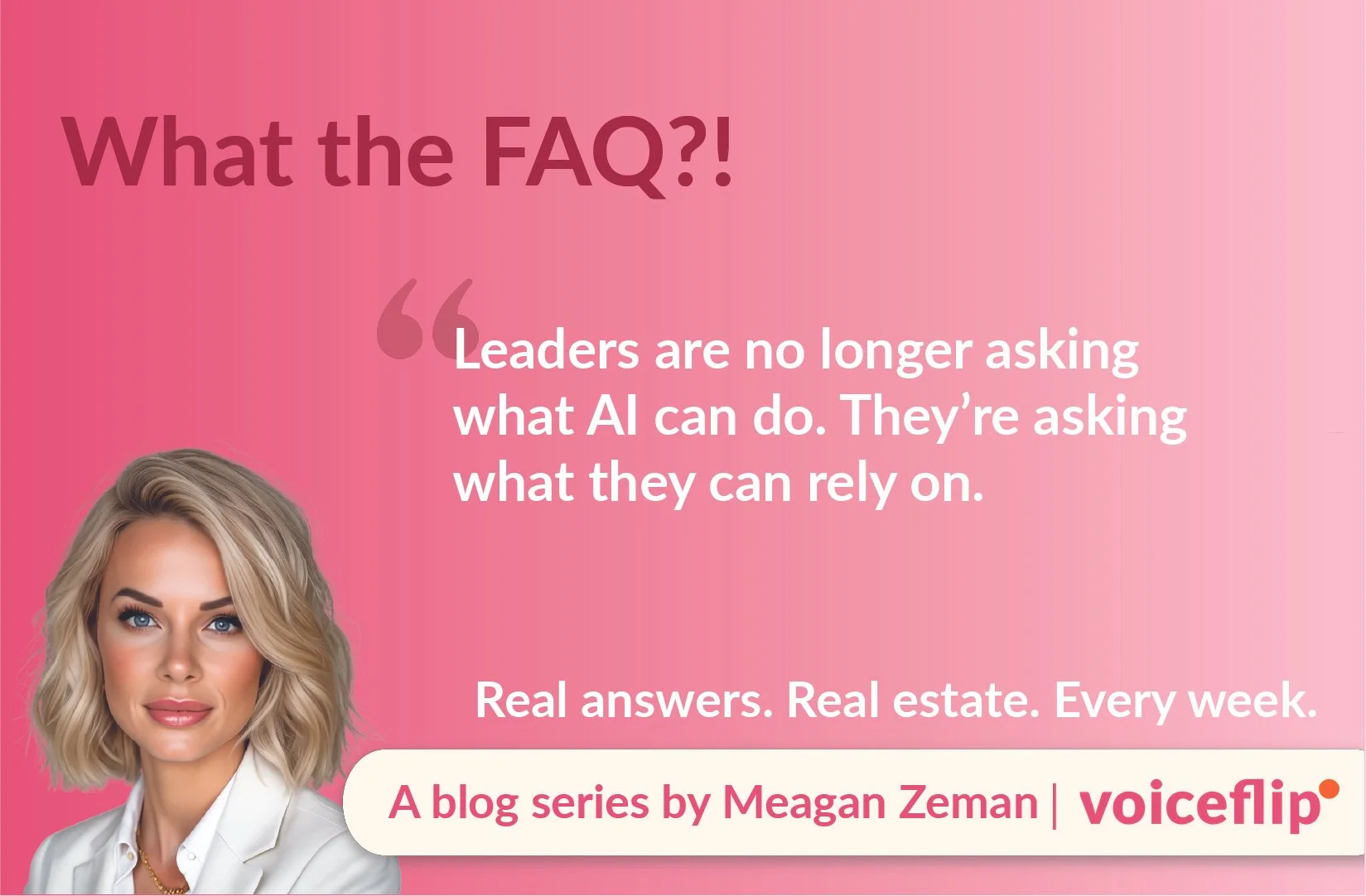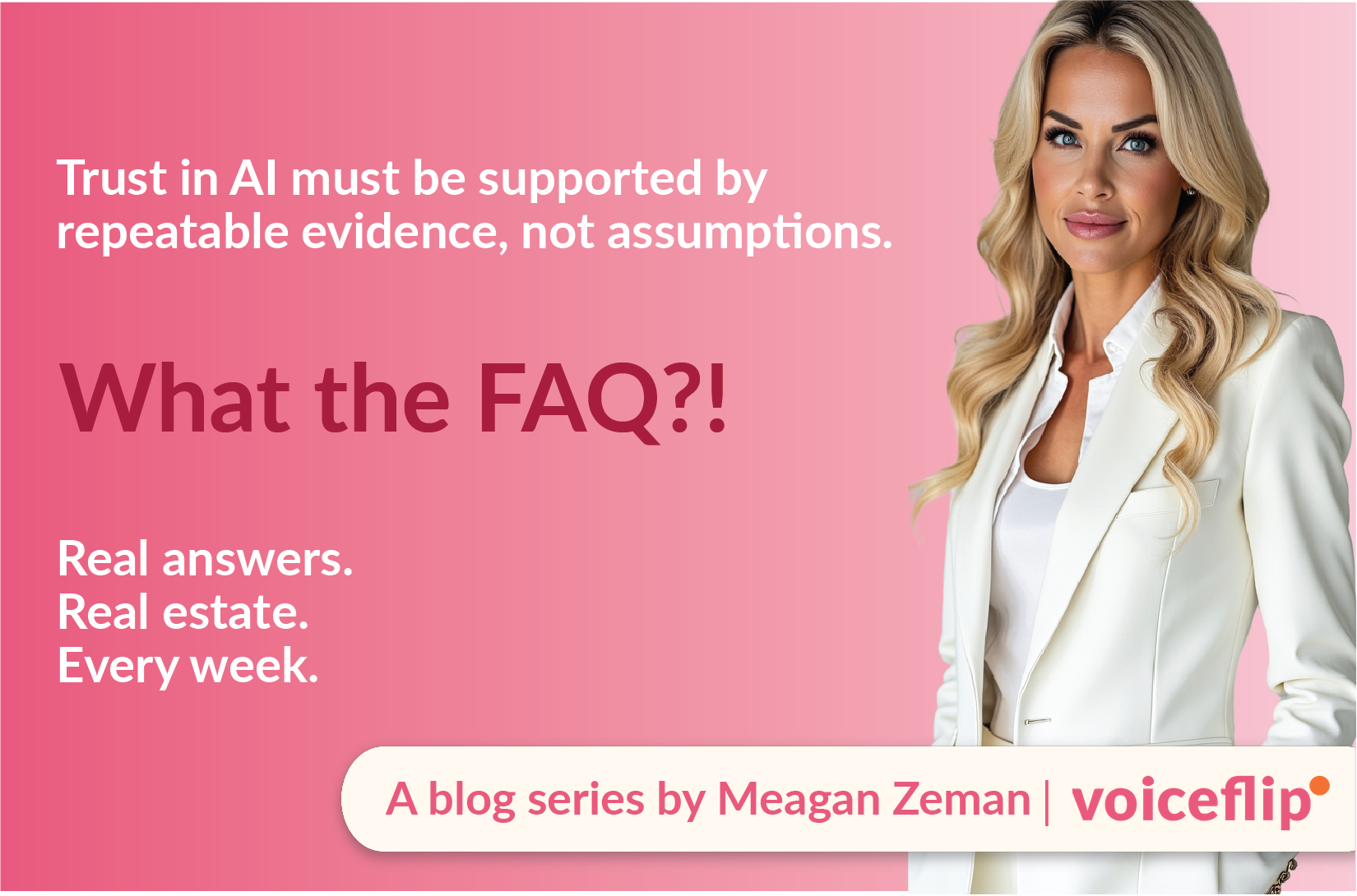Flipstream
Bite-sized brain fuel for real estate pros.
What the FAQ Is Actually Happening in AI Right Now?
Right now, the AI conversation is shifting from capability to dependability. For the last two years, headlines focused on bigger models, better benchmarks, and faster performance. But inside real organizations, the question has changed. Leaders are no longer asking what AI can do; they are asking what they can rely on. A compelling demo is not operational integration. A research breakthrough is not enterprise governance. The next phase of AI is not about flash. It is about disciplined deployment, defined accountability, measurable outcomes, and systems that can operate inside regulated, policy-driven environments without introducing risk. That is the real transition underway, and it will shape how industries like real estate adopt AI over the next eighteen months.
Why AI Security Measurement Matters
AI is no longer experimental. The conversation has shifted from “what can it do?” to “can we trust it?”
As AI becomes embedded in daily operations, it stops being a novelty feature and starts functioning like infrastructure. That changes everything. Leaders are no longer satisfied with performance demos. They want measurable assurance. They want to understand how the system behaves under pressure, how access is controlled, and how risk is tracked over time.
Security in AI is not about eliminating uncertainty. It is about measuring it. Real trust is built through repeatable testing, realistic attack simulations, and ongoing validation across the full application stack, not just the model itself. Because in practice, most vulnerabilities do not live inside the intelligence. They live in the connections around it. AI credibility will increasingly belong to the organizations that can prove how their systems hold up, before someone else tests them first.
Why Does Everything Feel So Fragile Right Now?
Some seasons just feel fragile. The news is louder, people are more tired, and uncertainty seeps into places it doesn’t belong, including our work. In moments like this, teams crave something steady: clear answers, shared understanding, and systems they can trust. AI doesn’t create instability, but it does expose it, surfacing outdated documentation, inconsistent rules, and knowledge that lives in people’s heads instead of reliable systems. That’s why data integrity isn’t a technical detail or extra work. It’s the foundation that turns AI from another source of stress into something that actually brings relief, carrying the remembering so humans don’t have to, and restoring confidence when it’s needed most.
Data Integrity Is the Most Underrated Part of AI
Everyone wants AI to be instant: upload the documents, flip the switch, and expect perfect answers. When something goes wrong, the technology gets the blame, but AI rarely creates problems on its own. It exposes the ones that already exist. Most organizations are operating on documentation that hasn’t been reviewed in months or years, with policies scattered across systems, rules that evolved without being rewritten, and critical knowledge living in people’s heads instead of on paper. Long before AI enters the picture, that information is already shaping decisions and member experiences. Data integrity isn’t a technical detail, it’s operational infrastructure, and organizations that treat it that way don’t just launch AI faster; they build clarity, trust, and confidence into every answer from day one.
AI Has Stopped Being Tomorrow's Problem
2025 wasn’t the year AI made noise, it was the year it quietly changed how MLSs operate. After years of discussions, panels, and “maybe someday” plans, organizations finally put AI to work, not as a disruptor but as a release valve. Staff teams felt the shift first: fewer repetitive questions, more space to focus, and a renewed sense of control. What this year revealed is simple but powerful, AI only works when the knowledge behind it is clean, accurate, and intentional. And as MLSs look toward 2026, success will come not from rushing into new tools, but from thoughtful planning, updated documentation, and a commitment to building AI into the core of member support.
Reflections from Houston: AI, MLS Operations, and the Policy Gap
My session in Houston highlighted just how uneven the MLS industry’s relationship with AI really is, some executives are experimenting confidently while others are just opening their first model, all without a shared framework to guide critical decisions. What quickly became clear is that MLSs are essentially on their own: NAR isn’t expected to deliver sweeping policy, leaving each organization to define acceptable use, prohibited use, data protections, and member expectations. That urgency grows as AI systems begin giving consumers inaccurate answers with no clear liability path, exposing a widening compliance gap. Leaders in the room compared this moment to the early 2000s, when IDX brought structure to unregulated data use, but AI poses a far more complex challenge because you can’t audit a model the way you audit a website. The takeaway from Houston was unmistakable, MLSs that start building thoughtful, informed AI governance now will be the ones best positioned to navigate what’s coming next.
One Foot on the Brake, One Foot on the Gas
Innovation isn’t just about speed, it’s about rhythm. At Voiceflip, we’ve learned that building something new in real estate means knowing when to accelerate and when to pause. This industry doesn’t reward chaos; it rewards trust. That’s why every decision we make, every product update, automation, and idea, is filtered through one question: Does this make life easier, faster, and more human for the people who use it?
Balancing progress with patience is the real challenge of innovation. It’s not about moving fast and breaking things; it’s about moving smart and building things that last.
Beyond the Portal: A Recap
At the 2025 RESO Fall Conference in Louisville, Matt Purcell (BPP) and Voiceflip’s Meagan Zeman broke down how MCP, APIs, and AI are finally working together to modernize real estate’s data flow. Their session explained how MCP acts as the connective tissue between structured data and intelligent systems, bringing accountability, transparency, and context to the data APIs transport. By pairing MCP’s governance with Voiceflip’s AI assistant, Ardi, MLSs can deliver instant, compliant answers directly from verified sources, protecting data integrity while transforming user experience. The result: less friction, more control, and AI-powered conversations rooted in MLS truth.
Beyond the Billboards
Beyond the Billboards explores the widening gap between AI adoption and AI understanding, and why that divide may be the industry’s biggest design flaw.
From San Francisco’s AI-saturated skyline to the boardrooms racing to deploy new tools, the blog uncovers a crucial truth: everyone is using AI, but few truly understand how it works. Author [Voiceflip or Meagan Zeman—depending on who’s credited] dives into what real AI literacy looks like, the three questions every company should be asking about their models, and why the future of AI depends less on innovation, and more on education.
Why Your Next Retention Strategy Should Include AI
Most MLSs focus on recruiting new members, but the real challenge is keeping the ones they already have. Members rarely leave because of price; they leave when they feel ignored, frustrated, or unsupported. In Why Your Next Retention Strategy Should Include AI, Voiceflip COO Meagan Zeman explains how AI can turn everyday support into a loyalty engine. From 24/7 help that builds trust to data that reveals early signs of churn, AI gives staff the freedom to focus on what truly keeps members, relationships.
How Real Estate Leaders Turn AI Into Action
Excerpt – How Real Estate Leaders Turn AI Into Action
Nearly 70% of agents are already using AI, but many associations and MLSs are still just “curious.” The risk? Falling behind your members. The key is to start small, tie AI directly to pain points like FAQs, compliance, or onboarding, and build from there. Real leaders don’t just talk about AI; they turn it into tangible member value.
Agentic AI: The Next Generation of Support Tools
These systems don’t follow trees; they reason, pick the right specialist agents, and take action, grounded in your first-party data and wrapped in governance. Think: analyze a billing issue, explain usage, apply a credit, escalate to a human, all in one flow. With multi-agent orchestration across vendors, support teams move from answering questions to shaping experiences. This isn’t automation for speed alone; it’s how you deliver efficient, human, end-to-end resolutions at scale.
-

Case Studies
Read how MLSs, Associations, Brokers, and PropTech leaders are using Voiceflip’s AI assistants.
-

Conversations That Count
Real talk with industry leaders and innovators shaping AI adoption in real estate.












